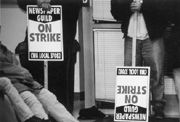THE BIG NEWS last week was the news. Life on the picket line was therefore upbeat. Daily newspaper strikers marched confidently in the spotlight, comrades in arms against cruel wages and tyrannous publishers. They chanted and waved picket signs. They cheered the raised fists and brassy honks of passing motorists. They broke into impromptu formation dancing for TV cameras.
Now, week two on the bricks, the strike is slouching toward the briefs. The high has ebbed, and reality settles in for 971 Seattle Times and Post-Intelligencer strikers, members of the Pacific Northwest Newspaper Guild. Thanksgiving was a bummer; here comes Christmas. Differences emerge, and the second-guessing begins: Did we ask too much; did we walk too hastily? Most importantly, do we have public support?
What if, here in the cradle of Dave Beck and the General Strike, we’ve called the first major newspaper walkout of the century and no one noticed?
“What’s to miss?” says Mason Denger, a Bellevue online network specialist. “It’s all on the Internet, isn’t it?”
How many times did I hear that last week? The Net, cable, the constantly emerging wireless technology—in a time of unprecedented electronic news alternatives, people say, what are these jokers from the dinosaur press thinking?
I queried friends and strangers—mostly “average readers” by newspaper standards—what they missed about their papers and, at times, was sorry I asked.
“What newspaper strike?” responds North City bartender Loren Deknatel. “Oh,” she adds, “Yeah, I saw something about it on TV.” That’s where she gets her news. “I buy a newspaper when I need to start a fire.”
Similar sentiments emerged in local TV interviews: Everyone had his or her cable or computer; a few were getting news headlines on their cell phones. Like Beck and union muscle, the deadline-constricted printing press itself was yesterday’s news.
“I read where the papers each have around 200,000 circulation,” says a friend. “What’s their market, two, three million potential readers? That’s a lot of uninterested people.”
“I used to read the papers,” says Sam Bryant, an Edmonds lighting salesman. “Then I read only Mike Mailway. Now it doesn’t much matter. I spent all night last night on the Internet.”
“I don’t think the [newspaper] union weighed its options very well,” says a Seattle attorney friend. “You don’t look across the bargaining table and see just the publisher anymore. You see cable and cyberspace and 24-hour news lining up against you.”
“I support the strikers,” Ron Smith, a Renton house painter, says. “I’m not reading either paper. Besides, they’re not carrying the Daily Game numbers. What good are they?”
“What’s the strike mean to me?” says Jan Sewell, a Capitol Hill real estate salesperson. “No open house ads.”
“It affects me personally,” says a smiling Ruth Bonvouloir, a college journalism student in West Seattle. “My teacher didn’t show up for class—he’s a Times editor.” She reads the papers regularly, however. “The job openings.”
“Don’t talk to me about the strike,” says oyster bar operator Thurmond Bryant of Burien. “I can’t get my sports scores! You ruined my day, bringing it up!”
Having worked as a newspaper writer all my so-called adult life, I was, as editorial writers would say, shocked and dismayed. What about, speaking of newspapers, the news?
Thank goodness for people like Pam Helton, a Ballard supermarket-deli boss. “My ritual is to sit down each morning with coffee and the newspaper. I read everything. But I pick up the Times—two sections, and one is sports. That burns my butt!”
And Darrell Stone, a Magnolia tavern operator, is a two-fisted newspaper kind of guy. “I read them both, news, sports. I like to hold them in my hand. I’m not one of those deranged computer freaks. But [the strike is] killing me—no columnists or late scores. When the union strike paper came out Friday, I drove down to the P-I, where the strikers were on the street, and asked if they had a copy. I offered a dollar; they gave me one for free. It didn’t have any sports, either. When’s this going to end?”
Talks may resume this week. Both sides say they want to negotiate.
Unfortunately, they said that in Detroit, 1995. That’s when 2,400 newspaper workers hit the bricks for the last big news strike of the last century.
It ended five years later, last month.
Like the Times and P-I, the Detroit News and Detroit Free Press continued to publish, slowly returning to full staffing. Reporters and other workers were welcomed back in 1997 but didn’t get their new contract until recently—essentially the contract they turned down in 1995.
The contract breaks labor’s historic hold in Detroit’s newsrooms, making union membership voluntary. The newspapers also lost a combined 288,000 circulation.
Last Tuesday, the Detroit newspaper guild announced it was ceasing publication of its interim strike paper. That same day, the Seattle guild began producing the online edition of its strike paper.
Tick, tick, tick.
“Do you think,” Darrell Stone asks hopefully, “the Weekly might do sports?”








